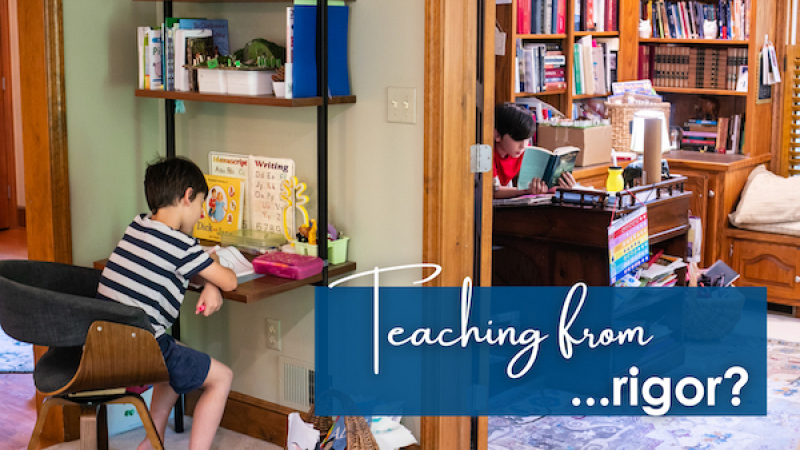Teaching from Rigor

Academic Rigor: The Myth and the Truth
What do you think when you hear that something is “rigorous”? Here’s a definition from the internet:
“Academic rigor…is about the quality of the teaching and learning. At an academically-rigorous school, students feel both success and challenge on a daily basis. In terms of classroom teaching, we view an academically rigorous curriculum as one that has high levels of student engagement and learning.”
Veritas is rigorous. We want it to be. But what do we mean when we say a “rigorous education”?
We just finished celebrating the end of the 2021-22 school year at what we call the EOYG. It’s the End-of-Year Gathering where we celebrate for five days. The highlight is graduation and the events around it.
Families attended from all over the United States and several countries. It was wonderful and so much fun to interact face to face with Veritas Families, who we normally relate to remotely. Their feedback to us during the event very often included how appreciative they are for the education their children are getting. They also mention that Veritas is rigorous.
I find the definition above very satisfying. That’s the kind of rigor we aim for. If our “students feel both success and challenge on a daily basis,” we believe we’re doing it right.
Occasionally, we hear that Veritas is hard. It certainly is for some and not as much for others. God’s gifted us all differently. Our goal is not to be hard but rather to be appropriate to the abilities of each student. Most schools today provide little real challenge to students. They have little hope in bringing out a student’s best.
In the last few years, we’ve become aware of a concept called restful learning. To be honest that sounds oxymoronic to me. If learning is work—and it is—and rest is what we do when we cease our work, then how can learning be restful? The term is meant to promote deep thinking and meaningful discussions. Why is that necessarily a restful endeavor? Can we not think deeply and have meaningful discussions if we are not in a state of rest?
Most nights when I go to bed, I feel tired. That’s a good thing. In the biblical account, with the creation of man on the sixth day, we see God creating work for man, too (Genesis 1:26-31). It was the seventh day when God rested, and we are commanded to do so, as well. However, we are not commanded to rest on the other six.
We’re frequently asked, “From where do you get your standards?” They come from observing successful historic and international standards. I’ve written much on the topic, so I’ll spare you here. Suffice it to say, we observe many higher standards in other countries than what is typical of an American K-12 education today or what was typical historically. These provide a good sense of what a student can do. It’s been working well for more than 30 years –since we started The Geneva School in Orlando.
Do realize that students who come to us in 7th grade or even later may not be ready to jump in at the same level as someone the same age who came up in our system. After all, if what we are doing is qualitatively better—and we believe it is—it should be the case that there are challenges to be met to catch up. We can work with those who want to work extra to catch up. The fact is that some of a classical education is better than none. That is why we want you to feel quite comfortable if your child may not be at a certain level when they come to us a few years into their education.
Finally, if you’re inclined to think that rigor is boring, suppresses creativity, rigid, and not enjoyable, you simply have not been around us. Making learning fun and gratifying is as important as making it challenging. An objective we carry throughout our work is to make lifelong learners of your children. We know if a student is to continue learning after his formal education, he must enjoy it. Fun it is. Fun it will remain! Just because it’s work doesn’t mean it can’t be fun. I love what I do. Hope you love what you do, too. And I’m thrilled that our students love what they do.
May we all be committed to realizing the God-given potential in our children.






